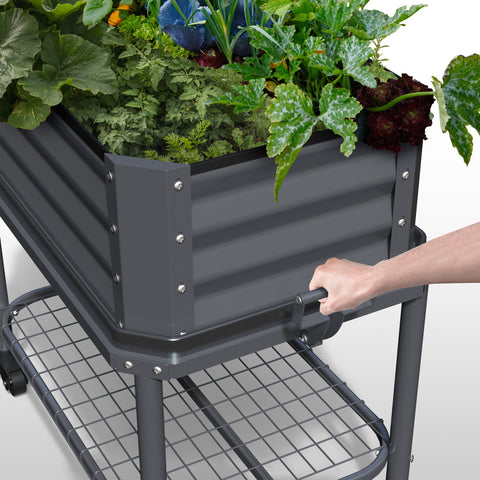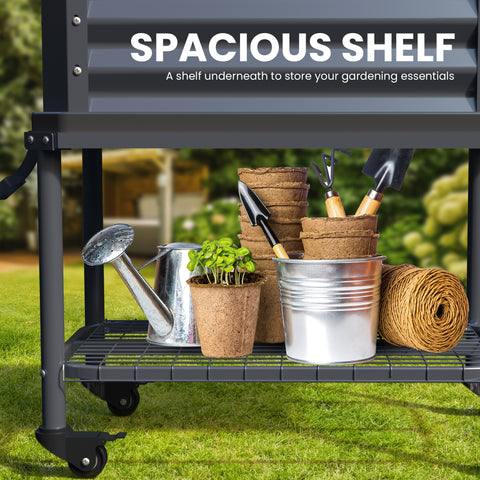As people become more concerned about health and environmental protection, more and more people are turning to organic food. Organic food refers to food produced in a natural and environmentally friendly way without the use of chemical synthetic pesticides, fertilizers, growth regulators and other chemicals in the production process. Growing your own organic food is a healthier, greener and more affordable option.The following content also has some reference value for raised garden beds.
Safe and healthy food refers to food that complies with safety and hygiene standards in all aspects of production, processing, transportation and preservation, does not contain harmful substances and additives, and can protect human health. To be specific, safe and healthy food should have the following characteristics:
Free of harmful substances: Safe and healthy food should not contain substances harmful to human health, such as heavy metals, pesticide residues, additives, etc. These substances may cause serious harm to human body, such as poisoning, cancer and so on. Balanced nutrition: Safe and healthy food should have the characteristics of balanced nutrition, can provide adequate nutrients for human body, such as protein, vitamins, minerals, etc., to ensure the health of the body. Production, processing, transportation and storage: Safe and healthy food should meet health standards in all aspects of production, processing, transportation and storage to ensure food hygiene and safety and avoid contamination. Reliable source: Safe and healthy food should come from reliable sources to ensure the quality and safety of food. For example, the planting and breeding environment should be good, and the manufacturer should have relevant qualifications and certificates to ensure the quality and safety of food
Growing your own organic food is a healthy, environmentally friendly, and affordable option. In this way, we can ensure the quality and safety of our food, protect the environment and save money for families at the same time. First of all, growing organic food can ensure the quality and safety of food. Many foods on the market today can have problems such as pesticide residues that can be avoided by growing your own. In the planting process, we can choose to use natural fertilizers and pest control methods, such as composting, crop rotation, intercropping, etc., and avoid chemical pesticides and fertilizers. The resulting food is not only healthier, but also more nutritious.
Second, growing your own organic food can also play an environmental role. Traditional farming methods often cause soil damage, land degradation, water pollution and other problems. Organic farming protects the land and promotes its restoration and preservation. At the same time, organic farming can also reduce the use of chemical pesticides and fertilizers to avoid environmental pollution and harm.
Finally, you can save money by growing your own organic food. Growing your own vegetables, fruits and other foods not only ensures quality and safety, but also saves you the expense of buying food. And in the process of planting, we can use household waste such as skin, vegetable leaves and so on to compost, not only saving costs, but also environmental protection of household waste. As a result, more and more people are choosing to grow their own organic food, boosting the development of organic farming
The process of caring for a garden is a part of family and community recreation because it can be fun and beneficial in several ways:To foster a spirit of cooperation and solidarity among family members or community residents in the care and management of the garden.
Provide a way to interact with nature, let people get closer to nature, feel the beauty and magic of nature.To increase the awareness and understanding of food in the family or community, to understand the whole process of food from planting to picking, so as to cherish food and health more.A variety of plants and flowers in the garden can bring visual beauty and pleasure, making people feel relaxed and comfortable in their busy lives.
By caring for a garden, families or communities can exercise and improve their health, as well as their self-confidence and sense of accomplishment.
Growing vegetables can relieve stress and anxiety and make people feel relaxed and comfortable by allowing them to get away from busy work and life and focus on things in the garden and on the land. Bending, squatting, digging, shoveling, etc., these movements can exercise the body, improve physical health, but also can improve blood circulation and metabolism. By planting vegetables, people can see the process of seeds from germination to growth and see the fruits of their own labor, thus increasing self-confidence and sense of achievement. Growing vegetables requires people to focus on what is going on in the garden and the land, which increases concentration and creativity, as well as making people more aware of the characteristics and needs of plants and the land. Growing vegetables allows people to exchange and share their experiences and knowledge with other gardeners or neighbors, thereby enhancing social and communication skills and building closer community ties.









